

Wp-content/uploads/2011-Editorial-Calendar-LightBox-Collaborative.pdf. Four Reasons Your Nonprofit Should Reconsider Facebook. April 27, 2010; Source: Nonprofit Tech 2.0 | Is your organization on Facebook?
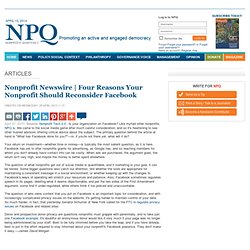
Like myriad other nonprofits, NPQ is. We came to the social media game after much careful consideration, and so it's heartening to see other trusted advisors offering critical advice about the subject. The primary question behind the article at hand is "What has Facebook done for you? "—or, if you're not there yet, what will it do? Your return on investment—whether time or money—is typically the most salient question, as it is here. The question of what nonprofits get out of social media is quantifiable, and if marketing is your goal, it can be tested. The question of who owns content that you put on Facebook is an important topic for consideration, and with increasingly complicated privacy issues on the website, it's getting harder to maintain control of your data.
About:blank. Flickr Photo by Yandel Note from Beth: Back in 2009, the first week I started as Visiting Scholar at the David and Lucile Packard Foundation, I had the pleasure of meeting Holly Minch, Founder of LightBox Collaborative, who is an expert at helping nonprofits and philanthropies unlock the potential of strategic communications for social change.
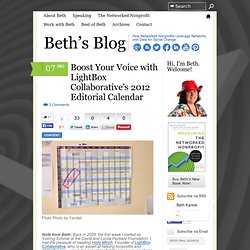
Content Curation: Are You A Fire Hose or A Focusing Lens? Flickr Photo by Salendron Does your nonprofit do content curation as part of its content strategy?

Content curation is the organizing, filtering and “making sense of” information on the web and sharing the very best pieces of content that you’ve cherry picked and shared with your network. It is a great technique to keep up with your field. I’ve been teaching content curation workshops this year and will teach it in the Middle East at the E-Mediat conference in March, 2012 (more about that in a later post). If that headline caught your attention, thank Robin Good, a virtuoso content curator, who will join me remotely from Italy when I do a talk on content curation at the next Social Media 4 Nonprofits Conference in January. As Robin points out, Seth is describing something that is hot debate right now in the content curation circles.
The debate in content curation circles is that we treat content curation as aggregation, then we’ll miss the point and just create noise. 4 Ways To Increase Productivity & Optimize Your Social Media Schedule. Making the time to execute on a social media strategy can rattle even the most experienced marketers.
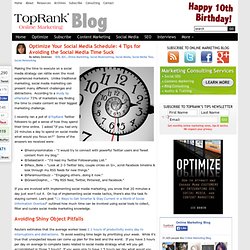
Unlike traditional marketing, social media marketing can present many different challenges and distractions. According to a study by eMarketer 73% of marketers say finding the time to create content as their biggest marketing challenge. I recently ran a poll of @TopRank Twitter followers to get a sense of how they spend their time online.
About:blank. Note from Beth: Alison Zarella is the co-author of the recently published “The Facebook Marketing Book.”
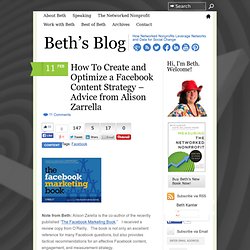
I received a review copy from O’Reilly. The book is not only an excellent reference for many Facebook questions, but also provides tactical recommendations for an effective Facebook content, engagement, and measurement strategy. 1. You’ve just co-written a book with your husband, Dan Zarrella called “The Facebook Marketing Book.” What was it like to co-write a book with your spouse? We wrote this book while we were in the middle of planning a wedding, and were actually editing on our honeymoon. 2. The key with using any of Facebook’s features is to take full advantage of the tools available to you. 3. One of the quickest and easiest ways to differentiate your Page is through content. 4. Social Media Policy Resources for Nonprofits. When Facebook was down last week due to technical problems, numerous news stories such as “FACEBOOK IS DOWN: Can Life Go On?”
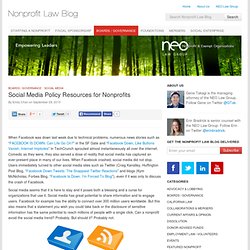
In the SF Gate and “Facebook Down, Like Buttons Vanish, Internet Implodes” in TechCrunch sprouted almost instantaneously all over the internet. Comedic as they were, they also served a dose of reality that social media has captured an ever-present place in many of our lives. When Facebook crashed, social media did not stop. Users immediately turned to other social media sites such as Twitter (Craig Kanalley, Huffington Post Blog, “Facebook Down Tweets: The Snappiest Twitter Reactions” and blogs (Kym McNicholas, Forbes Blog, “Facebook Is Down. I’m Forced To Blog”), even if it was only to discuss the crash of Facebook. 40+ Social Media Dashboard Tools for Tracking Stuff. How journalists are using metrics to track the success of tweets. When I first started on the BeatBlogging.org project almost three years ago, very few journalists and news organizations were using social media.
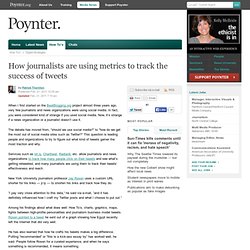
In fact, you were considered kind of strange if you used social media. Now, it’s strange if a news organization or a journalist doesn’t use it.